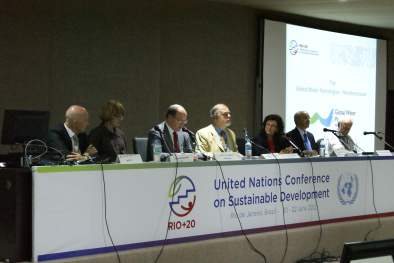Participation included that of HSH Prince Albert II of Monaco, many governments, UN and EU institutions, and GWP Technical Committee Chair Dr. Mohamed Ait Kadi. The Panel was chaired by Prof. Michael Scoullos, GWP Mediterranean Chair.The side event demonstrated the willingness of the Mediterranean people to collaborate around the common sea, despite the differences and the challenges the region faces. “The Mediterranean is a symbol of our failures and our hopes”, His Serene Highness Prince Albert II said, emphasizing that human unthoughtfullness has created an imbalance in nature and that all resources need to be mobilized to save the Mediterranean Sea.
GWP Chair Dr Mohamed Ait-Kadi said, “The conviction of the Global Water Partnership is that a new economic order, driven by the green economy, has as a corollary a new ecological order and a new solidarity order. Water security is at the heart of this trilogy. Water security in the Mediterranean Region is central to the innovative thinking and effective solutions required to establish the green economy.” He stressed that ”a green economy requires not only a shift in thinking on the way economies are run but also and most importantly an ethical change of our societies’ relation to water. Water security is a social responsibility at all levels – global, regional, national, and local.”
Mr Vangelis Constantianos, GWP Mediterranean Regional Coordinator, said that time is pressing and there is a need to act now for the Mediterranean Sea, listing four areas of action:
- Cooperation on management of Transboundary waters
- Groundwater – the hidden resources
- Non-conventional water resources management approaches, for instance rainwater harvesting, treated waste water reuse, etc.
- Joint planning on coastal management and IWRM
Concluding that “what gets measured, gets managed ”, Mr Constantianos stressed the importance of leadership, capacity building, shared monitoring tools and sharing of information to achieve the sustainable management of water resources in the Mediterranean.
The session ended by acknowledging education as critical for the sustainable development, and Prof. Scoullos concluded that the Mediterranean region must show a good example of collaboration for the future: “Together we can do much more than each country, organization or individual on its own.”
GWP Mediterranean co-organized the side-event with the Mediterranean Information Office for the Environment, Culture and Sustainable Development (MIO-ECSDE), UNEP Mediterranean Action Plan (UNEP/MAP), Union for the Mediterranean (UfM) Secretariat , Commission of the European Union (DGs: Environment, EuropeAid Development and Cooperation,, Maritime Affairs and Fisheries), Fondation Prince Albert II de Monaco and the Arab Network for Environment and Development (RAED).

